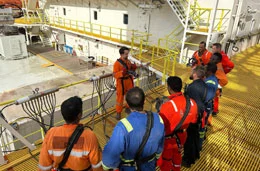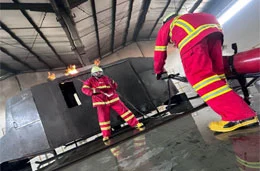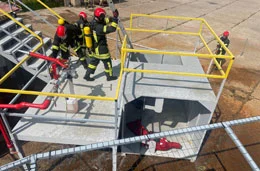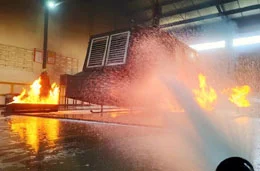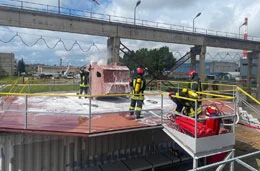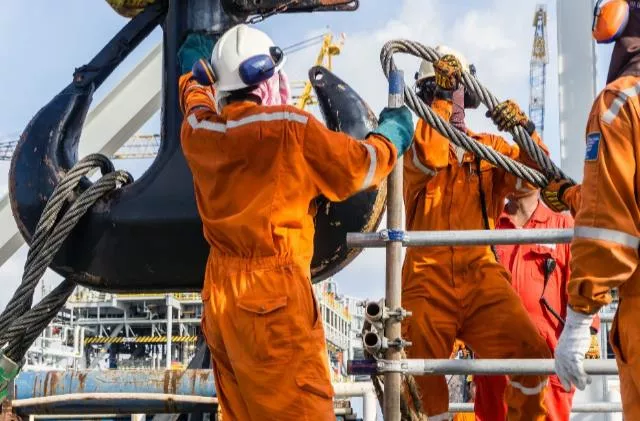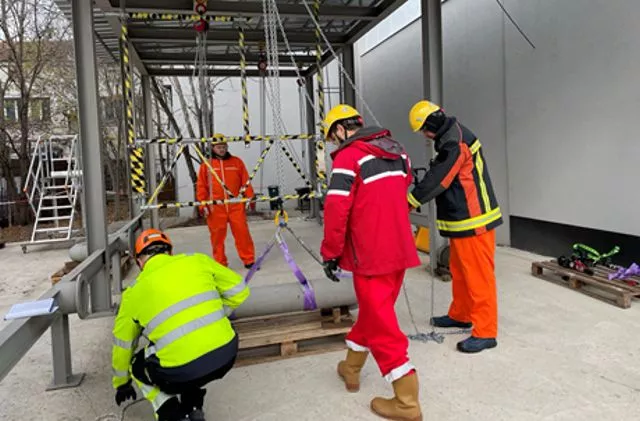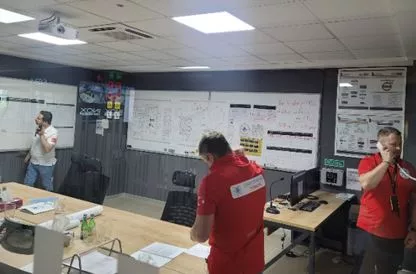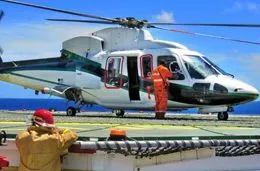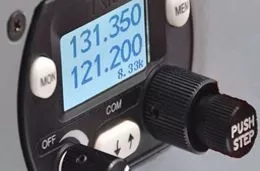OPITO Training Courses
OPITO is the global, not-for-profit, skills body for the energy industry.
The industry-owned organization works closely with governments, oil companies, major operators and contractors, offering a range of services and products to meet international skills demands and support workforce professional progress.
Each year more than 350,000 people are trained to OPITO Standards in over 50 countries.
In close conjunction with industry major players, OPITO identifies the needs and requirements for new and improved training and competence Standards for both onshore and offshore. OPITO holds a quality assurance role on behalf of energy industry through robust approval and surveillance processes thereby ensuring that each OPITO approved training centre delivers a consistently high level of training to learners worldwide.
Discover the Benefits of OPITO Courses
OPITO courses play a crucial role in ensuring the safety and competency of individuals working in the oil and gas industry. Whether you are a seasoned professional or just starting your career in the sector, understanding the benefits of OPITO courses is essential. This article will provide an overview of OPITO courses, explain their importance in the industry, highlight their key benefits, discuss the different types available, and provide guidance on choosing the right course for your career goals. Let's dive in!
Understanding OPITO Courses
What are OPITO Courses?
OPITO, short for Offshore Petroleum Industry Training Organization, is an internationally recognized organization that sets standards for training and certification in the oil and gas sector. OPITO courses are designed to equip individuals with the necessary skills and knowledge to work safely and effectively in offshore and onshore environments.
When it comes to working in the oil and gas industry, safety is of paramount importance. The nature of the work in this sector involves various risks and hazards that can be mitigated through proper training and certification. OPITO courses provide individuals with the tools they need to navigate these challenges and ensure their own safety, as well as the safety of their colleagues and the environment.
OPITO offers a wide range of courses tailored to different job roles and levels of experience. Whether you are a newcomer to the industry or an experienced professional looking to enhance your skills, there is an OPITO course that can meet your needs. These courses cover a diverse range of topics, including emergency response, survival skills, technical training, and competence assessment.
The Importance of OPITO Certification in the Oil and Gas Industry
Obtaining OPITO certification is crucial for anyone seeking employment in the oil and gas industry. Companies operating in this sector prioritize the safety of their workforce and clients, and therefore require individuals to hold OPITO certifications as proof of their competence. This certification assures employers that the individual has undergone rigorous training and possesses the necessary skills to carry out their job responsibilities safely and efficiently.
OPITO certification is not only beneficial for job seekers but also for employers. By hiring individuals with OPITO certification, companies can demonstrate their commitment to maintaining high safety standards and complying with industry regulations. This can enhance their reputation and give them a competitive edge in the market.
Furthermore, OPITO certification is not limited to a specific region or country. It is recognized globally, allowing certified individuals to pursue job opportunities in various parts of the world. This opens up a world of possibilities for those looking to work in the oil and gas industry and expand their horizons.
OPITO courses are not just about obtaining a certificate; they are about gaining valuable knowledge and skills that can make a real difference in the workplace. The training provided by OPITO goes beyond theoretical concepts and focuses on practical applications. Participants learn how to handle real-life scenarios, use specialized equipment, and respond effectively in emergency situations.
Moreover, OPITO courses often incorporate the latest industry standards and best practices, ensuring that individuals are up to date with the latest developments in their field. This continuous learning approach helps professionals stay competitive and adapt to the ever-evolving demands of the oil and gas industry.
In conclusion, OPITO courses play a crucial role in the oil and gas industry by providing individuals with the necessary skills and knowledge to work safely and effectively. The certification obtained through these courses not only enhances employability but also contributes to the overall safety and success of the industry. So, whether you are considering a career in the oil and gas sector or looking to advance your existing career, investing in OPITO courses can be a wise decision.
Key Benefits of OPITO Courses
Enhancing Safety Awareness
One of the primary benefits of OPITO courses is the emphasis on safety awareness. These courses cover essential safety protocols, emergency response procedures, and risk management techniques. By completing an OPITO course, individuals gain a deep understanding of the potential hazards associated with their work and learn how to mitigate risks effectively. This knowledge is invaluable in maintaining a safe working environment for themselves and their colleagues.
For example, during an OPITO course, participants are taught how to identify and assess potential risks in their work environment. They learn about the importance of wearing personal protective equipment (PPE) and how to properly use safety equipment such as fire extinguishers and gas detectors. Additionally, participants are trained in emergency response procedures, including evacuation protocols and first aid techniques. This comprehensive training ensures that individuals are well-prepared to handle any safety-related situations that may arise in their line of work.
Furthermore, OPITO courses often include practical exercises and simulations to provide participants with hands-on experience in dealing with safety challenges. These simulations allow individuals to apply their knowledge in realistic scenarios, further enhancing their safety awareness and response capabilities.
Boosting Career Prospects
OPITO certifications significantly enhance career prospects in the oil and gas industry. Employers prefer candidates who have undergone OPITO training as it demonstrates their commitment to professional development and their ability to adhere to industry best practices. Individuals with OPITO certifications stand out among their peers, opening doors to a wider range of job opportunities and potentially higher-paying roles.
Moreover, OPITO courses not only provide individuals with technical skills but also equip them with transferable skills that are highly valued in the industry. These skills include effective communication, teamwork, problem-solving, and leadership. Employers recognize the importance of these skills in maintaining a productive and efficient work environment.
Additionally, OPITO certifications are often required for specific job roles within the industry. For example, offshore installation managers, safety officers, and emergency response team members are typically required to hold OPITO certifications. By obtaining these certifications, individuals increase their eligibility for such specialized positions, which often come with greater responsibilities and rewards.
Compliance with International Standards
OPITO courses are developed in line with international standards, ensuring that individuals receive training that meets global industry requirements. This standardization ensures consistency in skill sets, regardless of where individuals are employed within the industry. OPITO certification is recognized worldwide and attests to an individual's competence, making it a valuable asset for those seeking employment in various geographical locations.
Furthermore, the international recognition of OPITO certifications allows individuals to easily transition between different countries and regions without the need for additional training or certifications. This mobility is particularly beneficial for professionals who wish to explore job opportunities in different parts of the world or for companies that operate globally and require a skilled workforce that can adapt to different environments.
Moreover, the adherence to international standards ensures that individuals are trained using the latest industry practices and technologies. OPITO courses are regularly updated to incorporate new advancements and best practices, ensuring that individuals are equipped with the most relevant knowledge and skills to excel in their roles.
Different Types of OPITO Courses
Basic Offshore Safety Induction and Emergency Training (BOSIET)
BOSIET is one of the most popular OPITO courses and provides a comprehensive introduction to working offshore. It covers essential safety measures, emergency response techniques, survival at sea, and the use of personal protective equipment. BOSIET certification is a prerequisite for many offshore jobs and is typically valid for four years.
Further Offshore Emergency Training (FOET)
FOET is designed for individuals who have already completed BOSIET and need to refresh their emergency response skills. This course updates individuals on the latest industry practices and ensures their knowledge remains relevant and up to date. FOET certification extends the validity of the BOSIET certification for an additional four years.
Helicopter Underwater Escape Training (HUET)
HUET is specifically aimed at individuals who may need to venture offshore via helicopter. This course provides training on escaping from a helicopter that has ditched or been involved in a water landing situation. It educates individuals on survival techniques in water, such as self-rescue, life raft usage, and helicopter safety procedures. HUET certification is typically valid for four years.
How to Choose the Right OPITO Course
Assessing Your Career Goals
Before enrolling in an OPITO course, it is essential to assess your career goals and determine which course aligns with your objectives. Consider the type of work you aspire to undertake in the oil and gas industry and choose a course that provides the necessary knowledge and skills for that particular role.
Understanding Course Requirements
Each OPITO course has specific prerequisites and entry requirements. It is crucial to carefully review the course requirements to ensure you meet the necessary criteria before enrolling. Some courses may require prior certifications or a certain level of work experience.
Evaluating Course Duration and Costs
Consider the duration and cost of the OPITO course before making a decision. Some courses may span multiple days or weeks, while others could be completed in a shorter timeframe. Additionally, compare the costs of different training providers to find the most affordable option that meets your needs without compromising on quality.
In conclusion, investing in OPITO courses can be highly beneficial for individuals seeking to enhance their career prospects in the oil and gas industry. These courses not only promote safety awareness but also boost competence, comply with international standards, and improve job opportunities. By understanding the various types of OPITO courses available and choosing the right one based on career goals and requirements, individuals can embark on a path of growth and success in this dynamic industry.
Frequently asked questions - OPITO Training Courses
Why choose OPITO approved training for your personnel?
Who is eligible for OPITO courses?
After completing the course with Lerus, will participants receive an official certification?
Lerus Training, an OPITO-approved training centre, offers a comprehensive range of OPITO training courses, setting the benchmark for safety and competency in the offshore petroleum industry. With a presence in 8 countries, Lerus Training is dedicated to providing top-tier offshore training that adheres to the rigorous standards set by the Offshore Petroleum Industry Training Organisation (OPITO). Their training program encompasses a variety of courses designed to meet the ever-evolving needs of the offshore oil and gas sector.
The OPITO training courses at Lerus include emergency response training, escape chute training, and specialized programs like OPITO HERTM (Helideck Emergency Response Team Member) and OPITO HERTL (Helideck Emergency Response Team Leader). These courses are crucial for personnel working in offshore oil and gas installations, ensuring they are equipped with the necessary skills for emergency situations, including escaping from a helicopter and handling compressed air emergency situations.
Lerus Training's OPITO offshore survival courses are renowned for their adherence to OPITO standards, which are globally recognized for ensuring safety in the oil and gas industry. These courses provide both initial training and refresher training, essential for maintaining OPITO certification. The training and certification offered by Lerus are not just about meeting requirements; they are about instilling confidence and competence in offshore personnel.
The range of OPITO-approved courses at Lerus Training includes practical training in pre-flight and in-flight emergency scenarios, ensuring that delegates are prepared for real-world challenges. The successful completion of these courses results in an OPITO certificate, valid internationally and recognized as a testament to the highest safety standards in the industry.
Lerus Training, accredited by OPITO, stands at the forefront of delivering comprehensive training programs tailored for the offshore oil and gas industry. OPITO-approved training courses are meticulously designed to uphold the highest safety standards and competency levels required in the offshore petroleum industry. These training solutions encompass a wide range of essential skills, from basic safety induction and emergency response to specialized roles such as Helideck Emergency Response Team Member (HERTM) and Leader (HERTL). The curriculum is structured to ensure that personnel working on offshore installations are well-prepared for emergency situations, including proficiency in using the Compressed Air Emergency Breathing System (CA-EBS), thereby enhancing safety and operational efficiency in the offshore sector.
The dynamic positioning (DP) simulator course, a pivotal component of Lerus Training's offerings, serves as an advanced phase in the dynamic positioning training scheme. Following the DP Induction Course, this simulator training is designed for individuals seeking to deepen their understanding and skills in simulated DP operations, including managing errors and system failures. Utilizing state-of-the-art Kongsberg simulators, the course offers participants a realistic training environment to practice the planning and conduct of typical DP operations. This hands-on approach, coupled with theoretical lessons, equips participants with the knowledge and skills required to operate redundant DP systems effectively, undertake risk assessments, and develop contingency plans, thereby preparing them for real-world challenges aboard DP-equipped vessels.
Lerus Training's in offshore safety and competency training is evident in their adherence to OPITO standards, recognized globally for setting the bar in industry safety. By offering a range of OPITO-approved courses, Lerus Training not only meets the initial and refresher training requirements for personnel working in the offshore oil and gas industry but also contributes to raising the overall safety standards within the sector. The successful completion of these courses culminates in the issuance of an internationally valid OPITO certificate, signifying the participant's adherence to the highest standards of safety and competency. For those looking to embark on or advance their career in the offshore oil and gas industry, Lerus Training provides the essential training and certification to navigate the sector's challenges safely and competently.


